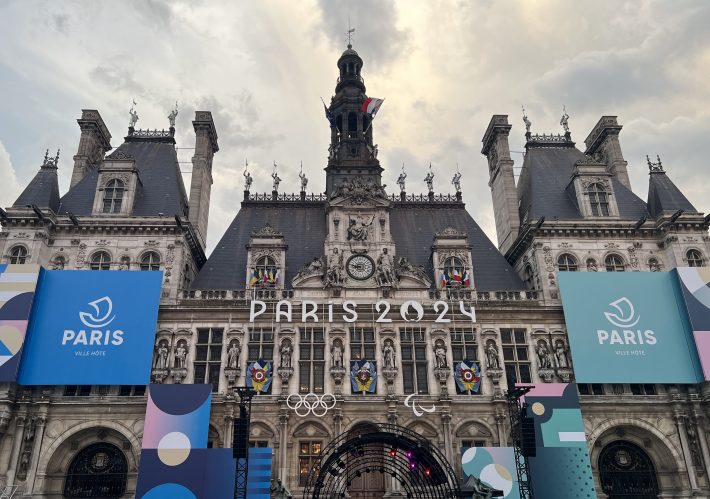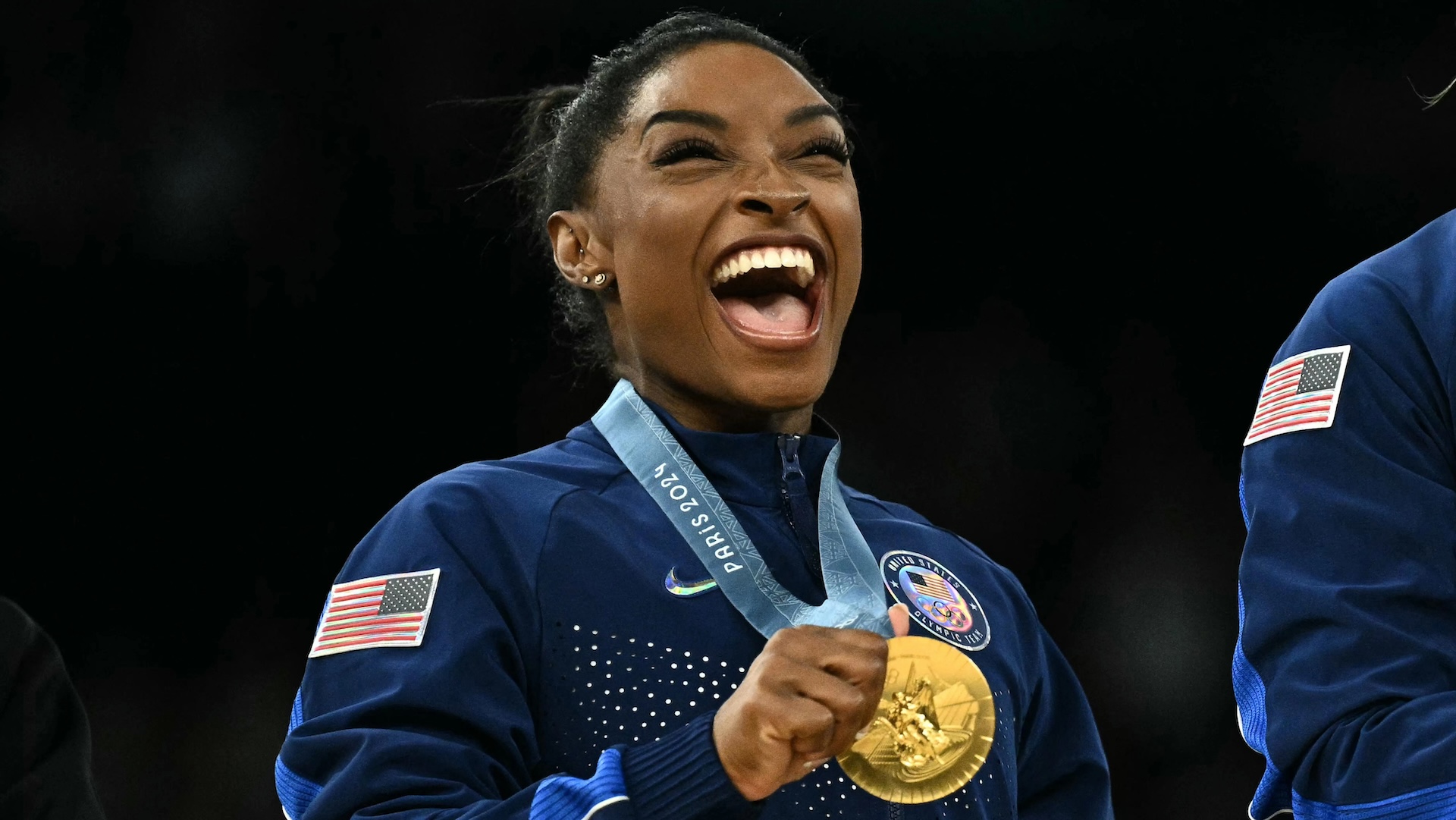PARIS — The greatest athletes force us to pay attention. It almost feels instinctual, like a piece of our primordial brains refusing to let us look away. It doesn't matter that these athletes are, to the rest of us, mostly unknowable strangers with private lives, inner ambitions, struggles, and shortcomings. How much a person understands a sport is almost besides the point. At their best, it can feel a bit like looking at the Mona Lisa or Liberty Leading The People; few people in the massive crowds who gather here in the City of Light to see those works of art understand the intricacies of oil paint and brush strokes, but that doesn't rob the masterpieces of their power.
That's why fans packed into the stands of Bercy Arena on Thursday evening, many of whom came from far outside France and paid hundreds of euros for a chance to witness history in person. And that's also why fans filled watch parties and country hospitality houses across the city to watch what happened when two of the greatest gymnasts in the world—Simone Biles and Rebeca Andrade—competed for all-around Olympic gold. That throng of fans included hundreds of people, and me, who filled into every seat and sprawled across the floor in the plaza-turned-outdoor viewing area at Paris City Hall, aka Hôtel de Ville.
Do not assume this looks like an American city hall. Dating back to the 14th century and reconstructed in the late 1800s, it is as grand and awe-inspiring as a church. But for these Olympics, the exterior, once home of the guillotine, has been transformed into a giant watch and experience zone, where anyone can pop in, buy some food and drinks, try their hand at a few very watered-down versions of Olympic sports (virtual surfing, fencing with plastic foils), take in live performances by dancers or musicians, and also watch two humungous video screens showing TV feeds of various Olympic sports as they play out. On Thursday, one of those screens turned to women's gymnastics.

France did not officially have an athlete in the women's gymnastics all-around competition. The entire French team failed to make it out of qualifying, a huge surprise given the host country's advantage and talent. But that didn't stop the French broadcast from focusing on women's gymnastics, always a huge draw of any summer Olympics, nor did it impede the mostly French-speaking and French-flag-waving crowd from getting deeply invested in what unfolded: Biles versus her nearest rival, Brazil's Andrade. (Though, admittedly, it's a friendly rivalry. The two openly encourage each other.) This evening, they came to watch Biles and Andrade compete, the kind of moment that's big enough to draw in plenty of people who don't typically follow the intricacies of women's gymnastics. If Biles won, she would become just the third woman ever to win two Olympic all-around golds, and the first to do it since the 1960s.
But Andrade was perhaps the only gymnast in Paris who could beat her.
Americans were here, but few and far between; just one United States flag waved. A few Brazilian flags were mixed in too, but this was, you could say, a mostly non-partisan crowd. They came to see greatness, and it soon became clear that meant, for many people, a Biles win. There was plenty of support for Andrade, but it never reached quite the same level. It speaks to the heights Biles has reached: the kind where Beyoncé narrates your story, Taylor Swift signs off on you using her music, and people on the other side of an ocean root for you because your gymnastics are that magnificent.
Each time Biles came on the big screen, the crowd grew quiet. When Biles competed on the uneven bars, even the people in line for beers stopped their conversations and turned to face the screen. What they saw was something rare: a Biles mistake. On bars she struggled on one of her transitions and it cost her. What had at first seemed like another Biles victory suddenly felt in doubt. After two rotations, Biles was in third, behind Andrade by 0.267 points. Afterward, Will Graves of the Associated Press asked Biles about what was going through her mind in that moment.
"I was probably praying to every single God out there," she said, "trying to refocus and recenter myself because that's not the bars that I've been training."
The broadcast followed Biles, Andrade, and the rest of their group on to their third apparatus, the balance beam. But the beam video feed suddenly cut out during the routine of Kaylia Nemour—who was in second after her uneven bars performance, and who used to compete for France before switching to Algeria after a fight with the French gymnastics federation. The crowd, who also cheered loudly for Nemour every time, grew concerned. This might have been the tensest moment of the night, the one with seemingly the greatest amount of doubt; nobody wanted to miss what was happening. Thankfully, the video feed came back just in time to watch Andrade and Biles.
On beam, Biles closed the gap. Each time Biles planted her feet safely on the apparatus, the crowd applauded. After her dismount, they applauded even more. When the broadcast confirmed Biles was ahead by a slim 0.166, more cheers followed. The giant screen would cut away for a bit to men's BMX cycling because France was in the lead, but even a possible home-country gold medal couldn't shut the door on Olympic women's gymnastics. The broadcast cut back just in time to show Suni Lee's floor routine, which she nailed—and she knew it, flashing a huge smile after her first tumbling pass, after struggling with kidney disease and concerns she wouldn't make the team. When Lee was done, the then-reigning all-around gold medalist from Tokyo had secured herself a bronze. The last two gymnasts up would be the ones the crowd wanted to see the most: Andrade, then Biles.
As Andrade took her place, people got more alert. Idle chatter died down. People adjusted their seats. I had been sitting on the floor, and two people sitting near me also on the floor stood up on their knees to see better. I copied their idea. The crowd clapped for Andrade's music and every stuck landing. The Brazilian flags waved extra high. But between tumbling passes, the crowd would grow quiet, as if somehow, collectively, we all feared our voices would jinx the athletes just a few kilometers down the road at Bercy.
Biles took her place, and up went the cell phones for photos and videos. The lone U.S. flag waved. Soon Biles took off for her first tumbling pass—with her high-flying triple-double—and, other than a step back, she stuck the landing. A massive smile spread across her face. To the smack of Biles's feet hitting the floor, the crowd cheered and applauded. What had once seemed in doubt returned to being inevitable, and even my limited French could understand the broadcast as they tossed around words like "magnifique," "incroyable," and that classically French term: "GOAT." Biles and Lee rushed back onto the floor, celebrating together. Later, Biles smiled into the camera and flashed a silver goat necklace. It would go nicely with her latest gold medal.
Afterward, Lee and Biles both talked to reporters. Lee talked about how happy she was to have Biles out there with her, competing together. And Biles acknowledged how Andrade forced her to raise her game, saying she hadn't been planning on doing her history-making Yurchenko double pike vault in the all-around competition, but she had "to bring out the big guns this time" with Andrade competing.
"I don't want to compete with Rebeca no more. I'm tired!" Biles said. A few questions later, she made the point even clearer: "I had just never been so stressed before. Thank you, Rebeca. But it's good. I'm going to hand it to her now. She can have the rest."
But this might have been the last all-around meet for Andrade, too. Afterward, she told Brazilians reporters, per Olympics.com, "I wanted tonight to be a very special competition because, to me, that was my last all-around." If true, it would end one of the fiercest gymnastics rivalries in recent history, with both Biles and Andrade always pushing each other, and thus the sport itself, to new achievements that once seem unfathomable.
I would learn all this later. Inside the fan zone, the crowd in my section rushed over to the other screen because it showed swimming. Perhaps they could catch a glimpse of greatness there, too. They weren't done soaking it all in and, with more gymnastics to go, neither is Biles. She'll compete in the vault final on Saturday.






